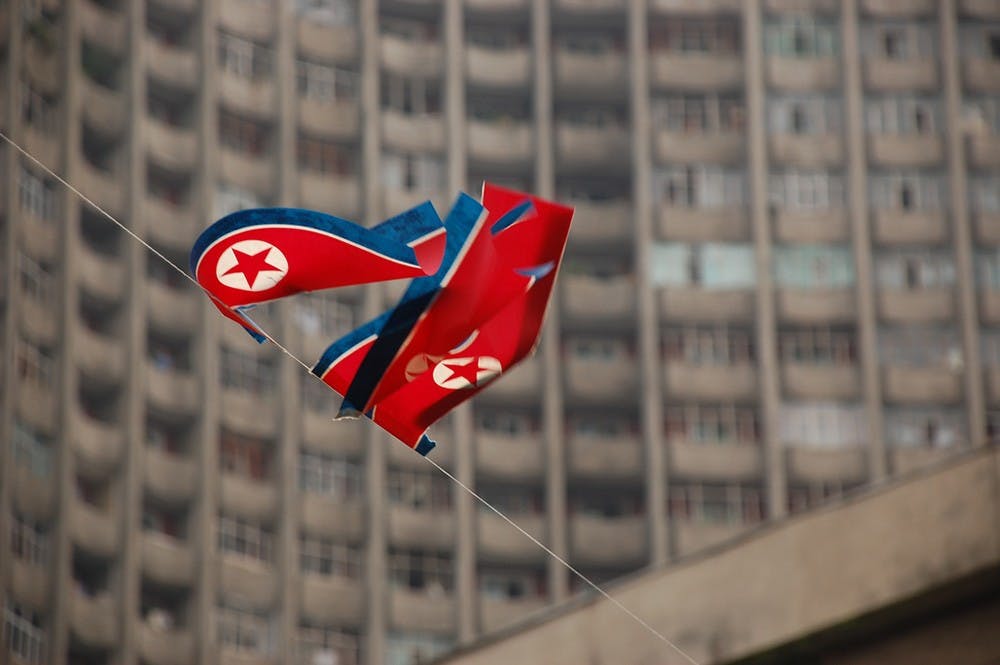Rapidly changing leadership, an evolving nuclear program and a secretive society make North Korea a problem that the United States does not know how to manage, said Mike Mazarr, a senior political scientist at the RAND Corporation, on Tuesday afternoon.
“This is one of those policy problems that the U.S. Government just doesn’t know how to deal with,” Mazarr said. “We don’t have very good answers.”
The speech Mazarr gave on Tuesday afternoon, titled “Inside North Korea: Changing Society, Growing Threat,” posed several policy options for handling North Korea, and the potential shortcomings of each. Throughout the entire lecture, Mazarr reiterated that there was no perfect solution.
“The North Korean regime is posing an increasing threat,” Mazarr said. “They are becoming more and more worrisome and out of control by the day.”
Mazarr delivered the lecture, organized by the political science department, to about 35 students and professors in the Whitehurst Living Room. Mazarr works for the RAND Corporation, which is an American think tank that conducts policy analysis for the U.S. Armed Forces.
One of the most challenging aspects of shaping U.S. policy regarding North Korea is the enigmatic nature of the country’s supreme leader Kim Jong-un, Mazarr said. His European education and young age indicate that he may be a reformer, but North Korean tradition and the powerful Kim dynasty suggest otherwise, he said.
“He lived in Switzerland,” Mazarr said. “Unlike most North Koreans, he knows how the outside world works and how badly his country is doing. Others say he knows he is too young to take this hidebound system and rip it into a new era.”
There are three basic strategies to handle the volatile country: engagement, coercion and strategic patience. Each has proven faulty in one way or another, Mazarr said.
The U.S. has been practicing a policy of “strategic patience” because it does not have any other decent options, Mazarr said. Instead of taking risks, the U.S. has decided to stay patient and not do anything.
The West has made repeated attempts to engage the country and make common-sense negotiations, Mazarr said. This has not worked because the regime is built upon a system of intense hatred and fear-mongering of the U.S. If North Korea negotiates with the U.S. or its allies, its residents would quickly flee to South Korea, he said.
Coercing the regime and enforcing strict sanctions would make war with North Korea a daunting reality, Mazarr said. Even if the U.S. was willing to risk an armed conflict, China could and would support North Korea because they have in the past and they share a border, he said.
“If they feel like they’re going to collapse, who knows what they might do,” Mazarr said.
Enjoy what you're reading?
Signup for our newsletter
NGOs and humanitarian groups have found a way to peacefully promote democracy and assist the North Korean people, but it poses a daunting problem to the South Korean government, Mazarr said.
When the winds are moving north, large groups of people gather at the DMZ, the North Korean-South Korean border, and release helium balloons filled with anti-North Korean pamphlets, food, newspapers and other aid, Mazarr said. This infuriates the North Korean regime because its people are given a glimpse of the outside world, he said.
Politically, the South Korean government can not shut the practice down, Mazarr said. Unfortunately, an extreme retaliation from the North is possible if the balloons continue to cross the DMZ, he said.
“North Korea is fascinating because we know so little about it,” said Scott Clutterbuck, a Richmond College senior. “It was great to hear a real expert talk about what is going on, and how the United States can deal with it.”
Mazarr took questions from the audience after the lecture, reiterating the complexity of shaping effective North Korean policy in nearly every answer.
“Whoever is elected as the next president will likely have a significant crisis regarding North Korea during their first term,” Mazarr said.
Contact contributor Hunter Ross at hunter.ross@richmond.edu
Support independent student media
You can make a tax-deductible donation by clicking the button below, which takes you to our secure PayPal account. The page is set up to receive contributions in whatever amount you designate. We look forward to using the money we raise to further our mission of providing honest and accurate information to students, faculty, staff, alumni and others in the general public.
Donate Now



